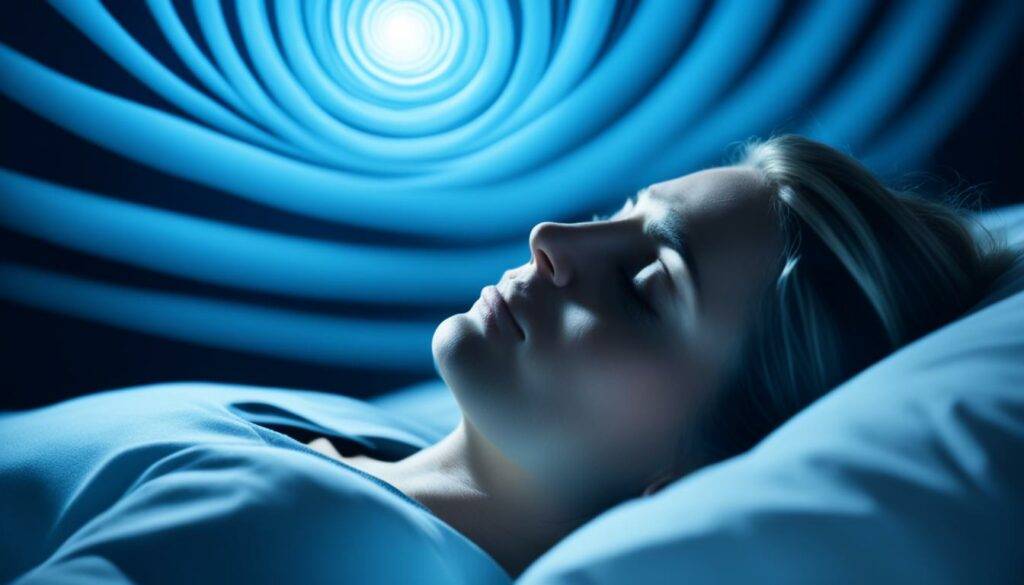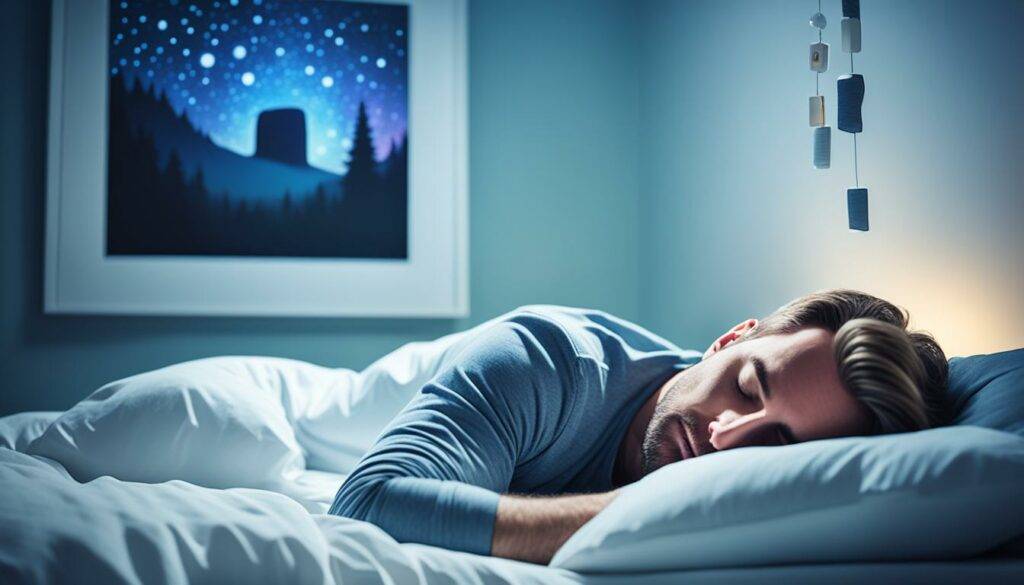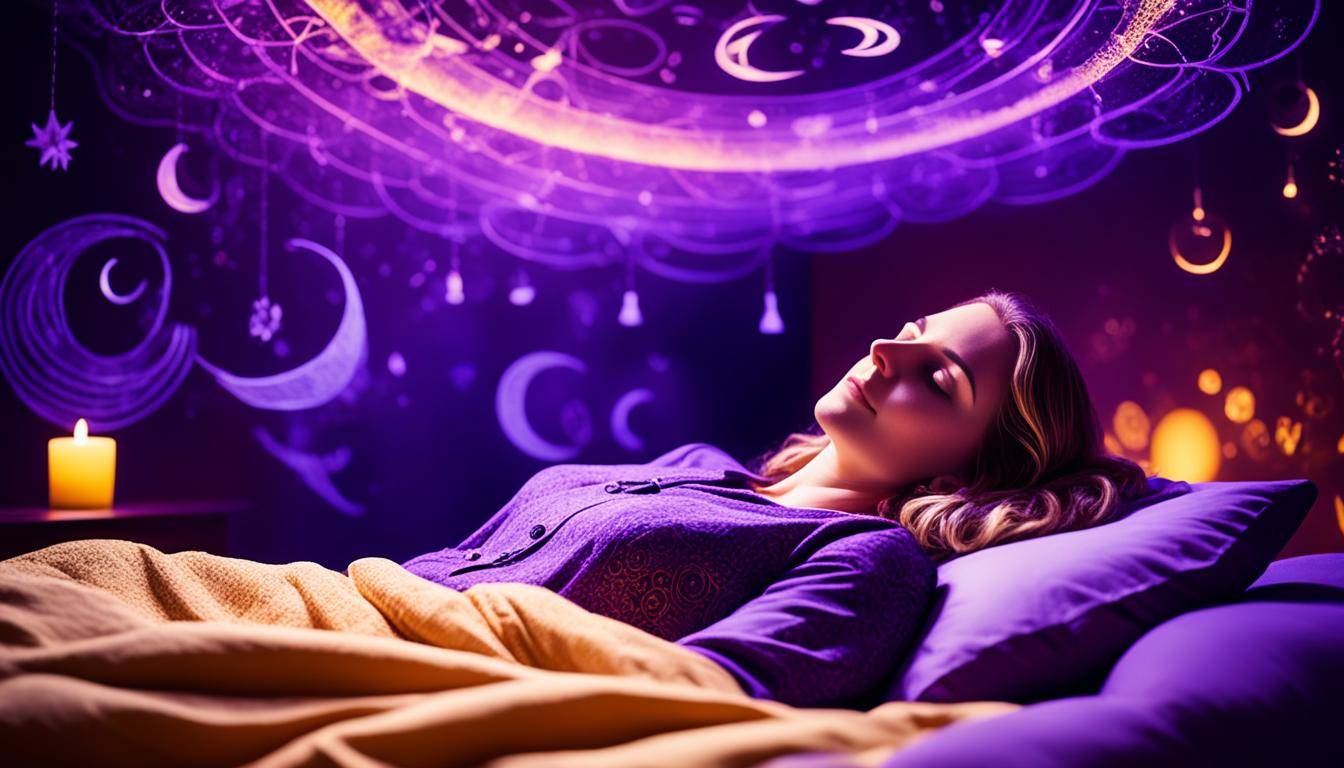“Sleep is the best meditation.” – Dalai Lama. This saying is very true, especially for adults who struggle to sleep well. In fact, 14.5% of adults have trouble falling asleep, and 18% use sleep medicines. But, what if you could use your mind’s power to improve your sleep? Hypnosis for deep sleep can help you do just that.
Deep sleep hypnosis uses your brain’s delta waves for deep relaxation and healing. Techniques like sleep hypnosis audio and guided meditations can make your sleep better and lower your stress. Studies show hypnosis can boost “slow wave sleep” by 81% and cut the time it takes to fall asleep by 67%.
This article will show you the many benefits of hypnosis for deep sleep. We’ll guide you on how to use your subconscious for better sleep. Whether you want personal growth or just a good night’s sleep, you have the power. Let’s start this journey to better sleep with the techniques in this comprehensive guide.
Key Takeaways
- 14.5% of adults have difficulty falling asleep.
- Hypnosis can increase deep sleep duration significantly.
- Regular practice can lead to an 80% improvement in deep sleep after hypnotherapy.
- Guided sleep meditations and sleep hypnosis audio can enhance relaxation and reduce anxiety.
- Private hypnotherapy sessions offer tailored solutions for unique sleep challenges.
- Exploring guided resources like Grace Smith’s “Close Your Eyes, Sleep” can be beneficial.
Understanding Sleep and Its Importance
Sleep is key to better health. It’s not just a luxury; it’s a must for your body and mind. Your body cycles through different sleep stages at night, each with its own role.
The Science of Sleep
You go through various stages in a sleep cycle. The main ones are REM and non-REM sleep, which includes light and deep sleep. These stages help with memory, muscle repair, and keeping your mood stable. Knowing about them helps you get better sleep.
Stages of Sleep and Their Functions
Let’s look at the main sleep stages and what they do:
| Sleep Stage | Function |
|---|---|
| REM Sleep | Memory consolidation and emotional processing |
| Light Sleep | Transition into deeper sleep; physical relaxation |
| Deep Sleep | Physical recovery and growth; immune system strengthening |
Not valuing sleep can harm you. Lack of sleep hurts your brain, mood, and immune system. Long-term sleep problems can lead to serious health issues like heart disease or diabetes.
What Happens When You Don’t Get Enough Sleep
Not sleeping enough can hurt you in many ways. You might struggle with thinking, feel more stressed, and be at risk for chronic illnesses. Understanding these risks can help you make sleep a priority. Techniques like hypnosis can also help you sleep better. Learn how your subconscious can improve your sleep.
What Is Hypnosis for Deep Sleep?
Hypnosis for better sleep helps you relax and accept positive suggestions. It’s a state where you focus deeply, letting go of worries. You can do it yourself or with a trained hypnotist, making it easy for those seeking more sleep.
Definition and Process of Hypnosis
Hypnosis means being very relaxed and focused. A hypnotist uses words and calming methods to help you relax. This can make sleeping better by easing racing thoughts and anxiety.
You can practice this at home with sleep-improvement recordings. This makes it easy to get better sleep.
How Hypnosis Affects the Brain
The brain and hypnosis have a special connection. Studies show hypnosis changes brain waves to help you relax. A study in the journal Sleep found hypnosis boosted slow brain waves by 80%.
This helps you sleep longer and wake up less at night. Hypnosis changes how the brain works during sleep. It’s a great way to get deeper, more restful sleep.
Benefits of Hypnosis for Deep Sleep
Hypnosis can greatly improve your sleep. It helps with many sleep problems. If you can’t sleep well, have trouble falling asleep, or want deeper sleep, hypnosis might help.
Falling Asleep Faster
Hypnosis makes falling asleep quicker. It reduces stress and helps you relax. Techniques like guided imagery and progressive muscle relaxation calm your mind, making it easier to sleep.
Studies show hypnotherapy can cut the time it takes to fall asleep. This makes your bedtime routine better.
Improving Sleep Quality
Hypnosis improves sleep quality a lot. It can increase deep and restful sleep by up to 80%. This deep sleep is key for feeling refreshed.
Hypnosis works on negative thoughts and behaviors that affect sleep. It makes sleep better. You’ll wake up feeling more awake and refreshed.
Reducing Stress and Anxiety
Stress and anxiety hurt your sleep. Hypnosis uses your subconscious to tackle these issues. It helps you manage stress, leading to less anxiety at night.
By quieting your mind, hypnosis creates a peaceful space for sleep. This lets your body and mind rest deeply.
| Benefits of Hypnosis | Description |
|---|---|
| Falling Asleep Faster | Hypnosis techniques help you relax and ease into sleep more quickly. |
| Improving Sleep Quality | Enhances the depth and restorative quality of sleep, promoting a fully restful experience. |
| Reducing Stress and Anxiety | Utilizes relaxation methods to address and alleviate the stressors that disrupt sleep. |
How to Use Deep Sleep Hypnosis Effectively
To get the most out of deep sleep hypnosis, add it to your bedtime routine. This can make you more relaxed and help you sleep better. Using guided sleep meditations is a great way to start.
Guided Sleep Meditations
Guided sleep meditations are special programs designed to help you relax. They often include soft music, nature sounds, and stories that calm you down. Many people find these sessions helpful in letting go of daily stress.
You can find these meditations on apps and websites. They create the perfect setting for sleep. It’s important to pick ones with good reviews and results.
Sleep Hypnosis Audio Resources
Adding sleep hypnosis audio to your routine can also improve your sleep. These audios have soothing voices that guide you into a sleep state. Listening to them regularly can help you sleep better.
There are many sleep hypnosis audios online. Make sure to choose ones that have been proven to work well.

| Resource Type | Description | Benefits |
|---|---|---|
| Guided Sleep Meditations | Structured programs featuring music and calming narratives | Promotes relaxation and eases the transition into sleep |
| Sleep Hypnosis Audio | Calming recordings designed to guide the listener | Increases duration and quality of deep sleep |
| Self-Hypnosis Techniques | Practices you can perform on your own | Helps manage sleep issues effectively |
Using these methods together can help you sleep better. Start with these techniques for a better night’s sleep. Try them out and see how they can improve your sleep.
Practicing Self-Hypnosis for Sleep
Learning self-hypnosis for sleep can make your nights peaceful. This method lets you use your subconscious mind for better sleep. With the right steps, you can relax deeply and sleep better.
Steps to Self-Hypnosis
Starting self-hypnosis has a few key steps:
- Find a quiet and comfy spot to avoid distractions.
- Think about what you want for your sleep, like a good night’s rest.
- Use relaxation methods, like deep breathing or muscle relaxation, to calm down.
- Make a mantra or affirmation to softly say to yourself during the process.
By following these steps, you might find it easier to fall asleep and stay asleep.
Creating a Relaxation Environment
Creating the right setting is key for self-hypnosis for sleep. Think about these things:
- Dimming the lights to calm down.
- Turning off distractions, like electronics and noise.
- Using scents like lavender to relax more.
- Setting the room’s temperature to be cozy.
A well-prepared space tells your body it’s time to relax. It helps you enter self-hypnosis easier. This makes self-hypnosis work better, giving you deep and restful sleep.
With effort, these practices can lead to better sleep and overall well-being. Try self-hypnosis for sleep to relax and clear your mind, making your sleep better over time.
Hypnotherapy for Insomnia: A Viable Solution
Many people struggle with insomnia, which affects their health and mood. In the U.S., one-third of adults don’t get enough sleep each night. This shows we need good solutions fast. Insomnia comes in different forms, each needing its own approach.
Understanding Insomnia and Its Impacts
Insomnia makes it hard to fall asleep, wake up often, and feel tired during the day. These problems can make daily life tough. Traditional treatments might not always work well, leading to more issues.
Hypnotherapy for insomnia is a new way to help. It helps reduce stress and deal with worries that keep you awake. Studies show that 70% of people got better sleep with this method.
Success Stories: Real-Life Transformations
Many have found relief from insomnia with hypnotherapy. Their stories show how this therapy can change lives. For example, research found that 58.3% of studies on hypnosis helped with sleep.
These stories prove hypnotherapy can be a powerful way to sleep better. It gives people control over their sleep.

If you’re looking into hypnotherapy, try hypnotic sleep meditation. It offers more ways to beat insomnia.
| Study Year | Findings |
|---|---|
| 2018 | 58.3% of studies on sleep hypnosis reported benefits. |
| 2020 | Evidence indicated significant improvements in sleep quality and reduction in daytime fatigue from nonpharmacological treatments. |
| 2020 | Moderate evidence that meditation, a practice combined with hypnotherapy, improved sleep quality for insomnia sufferers. |
| Journal of Clinical Psychology | 70% of subjects experienced enhanced sleep quality with hypnosis. |
Hypnosis for Deep Sleep: Techniques to Try
Adding hypnosis to your bedtime routine can change how you sleep. Learning different techniques helps you find what works best for you. Try relaxation hypnosis and sleep induction techniques to make falling asleep easier and more refreshing.
Relaxation Hypnosis Techniques
Relaxation hypnosis can make getting to deep sleep easier. You can use visualization and affirmations to calm your mind and let go of stress. Trying these methods can help you see what works best for you. Here are some popular techniques:
- Visualization: Imagine a calm place, like a quiet beach or a peaceful forest, to relax your mind.
- Affirmations: Say positive things about sleep, like “I am calm and ready for sleep,” to help you relax.
- Progressive Relaxation: Focus on tightening and relaxing each part of your body to ease tension and relax.
Sleep Induction Hypnosis Practices
Sleep induction hypnosis can help you relax deeply, making it easier to fall asleep. These techniques guide you into a calm state that helps you sleep better. Some effective practices include:
- Guided Sleep Meditations: These audio guides help calm your body and mind, leading you to sleep.
- Sleep Hypnosis Recordings: Programs like Sleep Fast, Sleep Deep, and the Insomnia and Self-Hypnosis Twin-pack offer lots of help for sleeping.
- Live Sessions with Hypnotherapists: Working with experts like Michael Sealey or Jason Stephenson can give you personalized advice and support for better sleep.
These techniques can help with insomnia, a problem that affects many adults. Using different tools, like long recordings and twin-packs, can really improve how well you sleep. Try these methods and see how hypnosis can help you sleep better.
| Technique | Description | Benefits |
|---|---|---|
| Visualization | Imagining a peaceful location | Calms the mind, reduces anxiety |
| Affirmations | Repeating positive sleep statements | Promotes a positive mindset toward sleep |
| Progressive Relaxation | Tensing and relaxing muscle groups | Releases physical tension, aids relaxation |
| Guided Sleep Meditations | Audio sessions to promote sleep | Helps ease into sleep |
| Live Sessions | Personalized hypnosis sessions | Tailored support for challenges |
Conclusion
This overview of hypnosis for deep sleep is a guide to help you overcome sleep issues. Hypnotherapy offers powerful ways to relax and improve sleep quality. Studies show it can boost Slow Wave Sleep (SWS), which is key for health, with few risks.
Trying out hypnosis, like guided meditations or self-hypnosis, can change how you sleep. These methods have shown good results. With ongoing practice, hypnotherapy can lead to better sleep and health.
This article aims to motivate you to improve your sleep. By using the techniques talked about, you can get peaceful sleep. This can make your nights and days better.
FAQ
What is hypnosis for deep sleep?
Hypnosis for deep sleep is a way to help you relax and become more open. It makes your sleep deeper and more healing.
How does deep sleep hypnosis work?
Deep sleep hypnosis uses your subconscious mind to let go of stress and distractions. You can use guided sessions or audio to help your brain relax and sleep better.
What are the benefits of using hypnosis for insomnia?
Hypnosis for insomnia helps you fall asleep faster and sleep better. It also reduces stress and anxiety. This leads to more restful sleep cycles.
Can I practice self-hypnosis for better sleep?
Yes, you can practice self-hypnosis for sleep alone. Find a quiet place, set your intention for sleep, and use relaxation techniques to get into a restful state.
How do guided sleep meditations enhance sleep quality?
Guided sleep meditations improve sleep quality by offering structured relaxation. They lead you to a calm state with soothing music and stories. This helps you fall into deeper sleep.
What precautions should I take when using sleep hypnosis audio?
Make sure you’re in a safe, comfy spot when using sleep hypnosis audio. Pick high-quality audio from trusted sources. Be regular with your practice to help your sleep patterns and fight insomnia.
Are there any side effects associated with hypnosis for sleep?
Hypnosis for sleep is usually safe and helpful. But, if you have mental health issues, talk to a doctor before trying it.
How can visualization be used in relaxation hypnosis?
In relaxation hypnosis, visualization means making mental pictures of calm places. This helps calm your mind and body, making deep sleep easier.
What is the role of breathing techniques in self-hypnosis for sleep?
Breathing techniques are key in self-hypnosis for sleep. They slow your heart rate and relax you. Deep, steady breathing helps you get into a calm state for deeper sleep.




























































